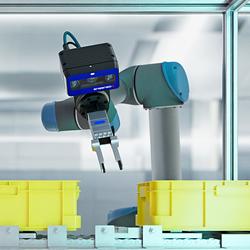WearTech Applied Research Center and GoX Labs Unveil Made-in-Arizona Superhuman Exoskeleton
Wearable robotics demonstration shows possibilities for university and industry collaborations for solving worker wellness challenges together
Phoenix, AZ (May 26, 2022)-- The WearTech Center, an applied research center accelerating the development of emerging technology products, along with Arizona-based wearable device companies GoX Labs and AKE, and Arizona State University's top mechanical engineering researchers, are advancing worker wellness and safety with new exoskeleton technology. Through the public-private collaboration, Arizona-based innovators announced they are developing a new exoskeleton that will make workplaces safer for millions of workers in many industries. The wearable exoskeleton technology called PhenEx will help workers squat and lift heavy loads promoting overall worker health.
"There are 89 million workers exposed to injury at work every day. As Arizona continues to grow as a hub for many different industries, the need for exoskeletons that promote workplace wellness only increases. Working through the WearTech Center to collaborate with ASU's researchers gives us the push we need to take our technology to the next level," said Dr. Joseph Hitt, CEO of GoX Labs.
At the WearTech Center, GoX Labs' and AKE's exoskeleton technology product development follows the applied research model which accelerates the process via collaboration with public and private sectors partners. The center shepherds these innovative products through the idea generation, project formation, validation, and commercialization phases.
"Innovations like what GoX Labs, AKE and ASU are developing through the WearTech Center have a high impact on reducing workplace injuries and enhancing Arizona's economic development," said Wes Gullett, Operations Director of Applied Research Centers for the Partnership for Economic Innovation. "The Arizona Legislature's public investment in applied research capabilities and our ability to connect innovators to the tools they need to accelerate their product's development grows Arizona's economy and fuels its innovation opportunities."
APEx is already being used by the U.S. Air Force by aerial porters to load heavy cargo onto planes. GoX Labs, AKE and ASU are continuing their collaborative efforts creating the quasi-active exoskeleton PhenEx with the support of the WearTech Center. The wearable PhenEx leverages sensors to activate spring elements when workers need to perform physical activities for their jobs. The quasi-active exoskeleton unlocks when the worker is at rest, walking or driving as to not hinder motion. The WearTech Center will assist with applied research and testing for product development.
GoX Labs and AKE will test out PhenEX on local employers like Amazon, Lucid Motors, and other industry partners through WearTech. Arizona employers can get involved in the testing of PhenEx by emailing info@goxlabs.com.
Information on WearTech Center projects and more is available at www.azweartech.org. To learn more about the Partnership for Economic Innovation and its initiatives, visit www.azpei.org.
ABOUT THE WEARTECH APPLIED RESEARCH CENTER
The WearTech Applied Research Center was created by Partnership for Economic Innovation (PEI) in 2019 to help launch a future-of-health technology ecosystem around Arizona's thriving biomedical scene. The Center offers an engineering lab and community space for innovation teams bringing disruptive IP to life. Their process connects entrepreneurs and industry to world class research teams and resources, helping through the idea generation, project formation, research prototyping validation, and commercialization of products. The WearTech Center is able to work towards its mission of growing Arizona's wearable tech ecosystem with support from key partners including the Ira A. Fulton Schools of Engineering, the Greater Phoenix Economic Council, the Center for Entrepreneurial Innovation, Startup AZ Foundation, and the City of Phoenix. Learn more at azweartech.org.
ABOUT THE PARTNERSHIP FOR ECONOMIC INNOVATION
Partnership for Economic Innovation is a passionate collective of business and community leaders dedicated to accelerating Arizona's economic opportunities. We believe innovators are problem solvers who come from anywhere, if they have access to pathways to do so - which is why PEI is investing in community-building technology and R&D designed to make Arizona more resilient and empower innovators to bring world-changing ideas to market. PEI initiatives include:
• WearTech and Blockchain Applied Research Centers are accelerating the development of emerging technology products with the potential to radically transform healthcare, keep us safer and more secure.
• Pipeline AZ, a career exploration platform creating more transparent pathways to advanced industry jobs and connecting Arizona workers to any training they might need to get there.
• The Connective, Greater Phoenix's internationally acclaimed Smart Region collaborative, convening cities, industries and entrepreneurs to lay the open innovation groundwork to solve regional challenges.
Featured Product

